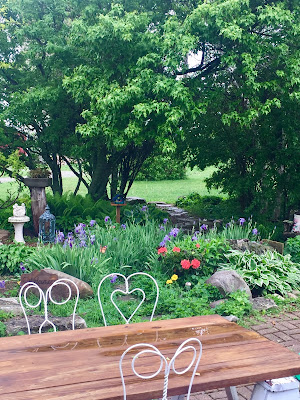Recently, the children and I completed Frances Burnett's The Secret Garden, and it was as lovely as I had remembered it.
The characters in the book had become a part of our lives, just as the characters in any good, absorbing book.
As with all our daily readings, I grab a hold of any teachable lesson or moral to impart upon my children.
This story had several.
I personally know people who will not read (or allow their children to read) anything that does not come from a Christian author.
I understand that. We are strict, too.
However, when reading a classic piece of literature that is wholesome overall, I would rather take the approach of teaching my kids to apply good sense and discernment while reading works from non-Christian authors.
This is a better way, I believe, because as the saying goes, don't throw the baby out with the bath water. *wink
In The Secret Garden we had an opportunity for that.
Mary and Colin, while experiencing the pleasure of watching Spring come upon their garden, falsely conclude that it must be Magic!
" 'I will go into the garden everyday,' he said, 'for there is Magic in there - good Magic, you know, Mary, I'm sure there is!'
'It is Magic,' said Mary.
And so, they always called it Magic."
It was at this point in the book that my Nola, who has always had a deep sensitivity to spiritual matters, shouted out, "It's God! It's God who is making the Magic!"
I stopped reading and the children and I had a good talk about it.
"Now, did Mary and Colin make the right conclusion?" I asked. "They were right to know that their garden was alive, and therefore something or someone must be in there making it come alive, but they reached the wrong conclusion."
When a book reaches a wrong conclusion, you can use it to sharpen you and to further cement upon your heart why you believe otherwise, by simply applying your own good sense to it and not getting swept along.
Much of the book, however, reached the right conclusion, and that, too, was a great opportunity for a lesson.
I loved the concept of the power of thoughts in the very last chapter...
"One of the new things people began to find out in the last century was that thoughts - just mere thoughts - are as powerful as electric batteries - as good for one as sunlight is, or as bad for one as poison. To let a sad thought or a bad one get into your mind is as dangerous as letting a scarlet fever germ get into your body...
When new, beautiful thoughts begin to push out the old, hideous ones, life comes back, blood runs healthily through the veins, and strength pours in like a flood. This science is quite practical and simple - when a disagreeable or discouraged thought comes into your mind, one must just have the sense to remember to push it out by putting in an agreeable, determinedly courageous one. Two things cannot be in one place, for where you tend a rose a thistle cannot grow."
(Our own secret garden...)
This is biblical, you know. We are told to "be transformed by the renewing of our minds." And, "Whatever is true, whatever is noble, whatever is pure, whatever is lovely, whatever is admirable - if anything is excellent or praiseworthy - think about such things."
(Romans 12:2, Philippians 4:8)
As long as we're talking about gardens, how are your gardens coming along?
I have some flower beds of perennials, a few planters of annuals, and a tiny little vegetable garden.
I have learned that two rows of lettuce is way too much for our family! We have lettuce coming out of our ears and are frantically eating multiple salads each day just to keep up! haha!
I guess Dickon's advice is right... the simple moor boy who had become Mary and Colin's good friend said this about their garden, "All a chap's got to do to make 'em thrive is to be friends with 'em. Gardens are just like all other creatures. If they're thirsty give 'em a drink, and if they're hungry give 'em a bit of food. They want to live same as we do."
I have remembered that this summer...
They want to live same as we do.
While there is a sense of emptiness to close a book for good, a sense of pining to select a final resting place for it on the bookshelf, the lessons and characters remain with us.
"Where you tend a rose a thistle cannot grow."
Thanks for reading, friends.
xo,
~ Courtney ~





No comments:
Post a Comment
I love receiving your kind comments! They make blogging much more fun when I can interact with friends!